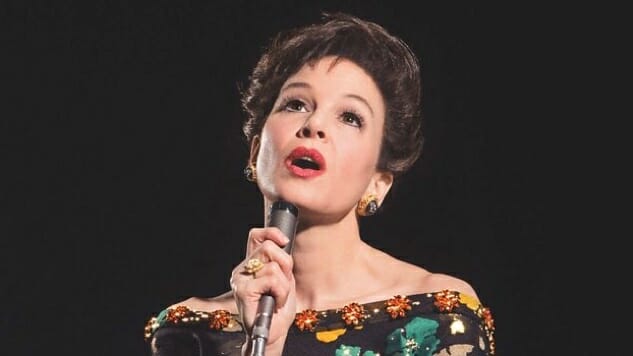The standard “Somewhere Over the Rainbow” takes on a powerful new meaning in Judy, the latest drama from director Rupert Goold and writer Tom Edge. In the biopic, aging legend Judy Garland (Renée Zellweger ) runs across New York, and eventually across the globe, to keep working. Based on the play End of the Rainbow by Peter Quilter, Judy plays as a subdued rehashing of some of Garland’s most scandalous moments. In the hands of Goold, Edge and Zellweger, the story blossoms into a heartbreaking journey of one abused soul reaching out to, and rejecting, nearly everyone that will have her.
Flashing back and forth between the alcoholic final haze of Garland’s career and the pill-popping days of her youth, Garland’s darkest and loneliest days frame her existence. Frequently bordering on melodrama, Zellweger does her best to center the film on the individual, not the celebrity. In her best performance since Chicago, Zellweger disappears into the icon. Her usual on-screen traits—the curled lips, stamping feet and balled-up fist—are replaced with a justified rage that she wields like a whip. Every insult slung lands precisely and without mercy, though she gets as good as she gives. When faced with the crackling loathing of ex-husband Sidney Luft (Rufus Sewell), she swells like a pufferfish at the indignation that she was ever anything less than a wonderful mother. But, when she asks her daughter if moving to her father’s would make her happy and her daughter replies yes, she caves in on herself at the perceived loss of the last person who made her feel needed and loved.
The Garland-obsessed fan won’t learn a lot from watching this biopic, but education doesn’t appear to be the main goal of the filmmakers. The impact of the once golden girl on her family and her fans carries the most emotional punch. In the case of the latter, especially, Judy does a spectacular job highlighting Garland’s connection to the gay community.
Queer icons tend to be big-breasted divas with a lot of attitude and something to say. (Think of some of the most popular drag queens.) Both white gay men and beautiful women with power operate under the same oppression. Between 1930 and 1960 they were accepted as long as they didn’t make too much of a fuss. Both parties were subject to physical violence for expressing their desires, and often needed a straight man to vouch for them in public settings. Not surprisingly, women who broke the mold became idealized forms in the queer community.
In a Huffington Post interview, Justin Sayer described Garland’s impact on the gay community. “She’s kind of like the ultimate comeback kid,” Sayer began. “I think what’s most unique about Judy is that she really communicated, in real terms, the depth of human feeling. For many gay people … we kind of grow up in a world where we’re not allowed to go there a lot of the time.”
Zellweger shines. At this point in Garland’s career, she was a professional drinker and a lifelong smoker. Having recently undergone surgery on her vocal cords, Garland could no longer deliver the crystal clear notes that made her a star. Zellweger lets the uncertainty of higher notes and the tremble of sustained breaths stick out. Some songs are half-spoken to avoid reaching too far out of Garland’s limit. As the film depicts Garland’s early rebellion and the consequences of having her soul stolen by industry at such a young age, the moments Zellweger allows vocal faults to slip through become heart-wrenching.
In Judy, romance is as an allusive totem for Garland. After all, demanding a perfection from her suitors that she couldn’t hope to reciprocate is a recipe for disaster, not fulfillment. The love of Garland’s life couldn’t be human, for what single individual could give what the stage gave? Under the bright lights, Garland has given the audience every piece of her soul. They take the good and the bad, without stopping to consider the person at the center. This would come across as especially heartbreaking if Zellweger didn’t showcase so faultlessly the joy the exchange between audience and performer gave to Garland herself. (Zellweger’s banter with the audience is so convincing I wondered if the dialogue had been improved.)
Outside of Zellweger’s stunning performance, there’s not a ton to gush about in Judy. Shot prettily with appropriate costuming and a lovely score, it’s the perfect Sunday afternoon musical movie. (If you’re a sap, like me, bring plenty of tissues.) Fueled by Zellweger, Judy has the power to take you over the rainbow with Garland, past the bright lights, through the cold nights, and into the pure love between an icon and her audience.
Director: Rupert Goold
Writer: Tom Edge (screenplay), based on Peter Quilter’s stageplay End of the Rainbow
Starring: Renée Zellweger, Jessie Buckley, Finn Wittrock
Release Date: September 27, 2019
Joelle Monique is a Rotten Tomatoes-certified critic. A graduate of Columbia College Chicago, her passions include movies that sit at intersectional crossroads and high stakes drama TV. You can find additional work at Pajiba and follow her on Twitter.
